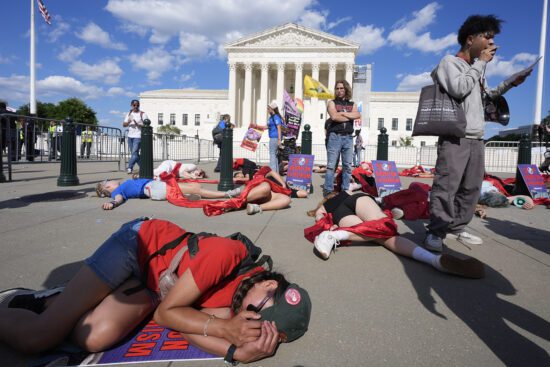Republicans adopted a new platform at their party’s convention in Milwaukee. One of the most-watched sections has been the language around abortion rights.
STEVE INSKEEP, HOST:
Republicans adopted a platform at their party convention in Milwaukee yesterday. We have been reporting that the platform is shorter and more general than past party platforms have been, and it’s especially notable what the document says and doesn’t say about abortion rights. NPR’s Sarah McCammon has covered this issue for years and joins us from Milwaukee. Sarah, thanks for getting up early – really appreciate it…
SARAH MCCAMMON, BYLINE: Sure thing, Steve.
INSKEEP: …Grateful that our folks get up early at the convention when all the business is taking place late. Now, as regards this platform, what makes every word matter when it comes to this issue?
MCCAMMON: You know, it matters because abortion-rights opponents have been such an important part of the Republican base. They’re very organized, very vocal, and they have fought for years to keep strong antiabortion language in the Republican platform. And Steve, this year is unique because the document, first of all, hasn’t changed since 2016…
INSKEEP: Right.
MCCAMMON: …And it’s the first new platform since the Supreme Court’s Dobbs decision two years ago overturned Roe v. Wade and opened the door to all of those new abortion restrictions in many states around the country.
Now, Democrats have been highlighting that, telling voters that Republicans want to go further and pass national restrictions. And in response, former President Trump is stressing that he wants to leave this issue to the states. But some antiabortion activists in the party say that’s not enough. They’re pushing for more, and that tension is reflected in this new platform language.
INSKEEP: Well, sure, there are a lot of things short of a national ban that a president can do that affect abortion rights in one way or another. So how is that tension resolved in the platform language, if at all?
MCCAMMON: Well, it’s not really resolved. It’s ambiguous, according to a lot of people I’ve talked to. The new platform – you know, it highlights this power of states to pass antiabortion laws, as they’ve done. It also removes references to supporting a national 20-week ban and a constitutional amendment restricting abortion.
Some conservative leaders, including former Vice President Mike Pence, say the new antiabortion language isn’t strong enough. A group he leads published a letter to the delegates expressing outrage and concern about this. One of the signers of that letter is Brent Leatherwood with the Southern Baptist Convention.
BRENT LEATHERWOOD: We’re in a post-Roe moment ushered in by the Dobbs decision. Now is the time to communicate a full-throated commitment to the sanctity of life.
MCCAMMON: So he sees the platform as backing off, but other antiabortion activists are more supportive of the changes, including Kristan Hawkins of Students for Life.
KRISTAN HAWKINS: Is the pro-life statement in the platform as eloquent as it used to be? No, it’s not. But can I work with it? Absolutely.
MCCAMMON: Now, a key thing for Hawkins, Steve, is the new platform still includes language that seems to imply that fetuses are already protected by the 14th Amendment to the Constitution. She says that interpretation, that language is really important for advancing her goals, which include pushing for federal limits on abortion pills – something they would likely push for under a potential Trump administration.
INSKEEP: So what does all this signal about the politics around abortion this year?
MCCAMMON: You know, I talked to Mary Ziegler, a law professor at UC Davis. She says the politics are much more complicated now for Republicans than they were before Dobbs.
MARY ZIEGLER: Some of that is because the party is so entirely dependent on what Donald Trump wants and thinks, and some of it is because Dobbs has made so many of the pro-life movement’s positions so much more unpopular.
MCCAMMON: Now, you see this in the way Trump talks about abortion and in the way his new vice presidential nominee, Ohio Senator J.D. Vance, talks about it. He, in the past, has compared abortion to slavery and has been a staunch antiabortion opponent. But more recently, he’s shifted his position to be more in line with Trump’s and has expressed support, for example, for access to abortion pills.
INSKEEP: Sarah, thanks very much for the insights – really appreciate it.
MCCAMMON: Thanks, Steve.
INSKEEP: NPR’s Sarah McCammon is reporting from the Republican Convention in Milwaukee.
Read the full NPR interview here.




